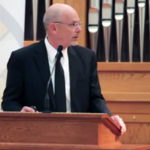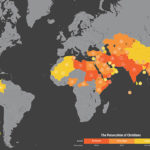WACO—Religious attitudes that permeated World War I—the “war to end all wars”—sowed seeds for future international conflicts, a Baylor University historian said.
 Almost 17 million soldiers and civilians were killed between 1914 and 1918. (ABPNewsHerald/Wikimedia Commons Image)As the 100th anniversary of the war approaches this summer, Philip Jenkins insists attitudes prevalent then have influenced how global powers see each other today, often viewing themselves as favored by God.
Almost 17 million soldiers and civilians were killed between 1914 and 1918. (ABPNewsHerald/Wikimedia Commons Image)As the 100th anniversary of the war approaches this summer, Philip Jenkins insists attitudes prevalent then have influenced how global powers see each other today, often viewing themselves as favored by God.
During World War I, which began July 28, 1914, Germany saw itself as a religious force on a “messianic mission,” while Russia saw itself not just as “a” Christian state, but as “the” Christian state, Jenkins said in a recent interview with Interfaith Voices, a public radio religion news magazine. Jenkins, professor of history at Baylor, is author of The Great and Holy War: How World War I Became a Religious Crusade.
 Philip Jenkins is distinguished professor of history at Baylor University and a prolific author.Those seeing the war as a religious crusade were “not just elite thinkers or a few crazy bishops and pastors. … Religion dominated propaganda messages and the way people thought about the war, wrote about the war, made films about the war,” Jenkins said. “Religion was part of the air they breathed. … The enemy was an evil satanic foe.”
Philip Jenkins is distinguished professor of history at Baylor University and a prolific author.Those seeing the war as a religious crusade were “not just elite thinkers or a few crazy bishops and pastors. … Religion dominated propaganda messages and the way people thought about the war, wrote about the war, made films about the war,” Jenkins said. “Religion was part of the air they breathed. … The enemy was an evil satanic foe.”
Angels and the Virgin Mary were reported as appearing regularly on battlefields, he noted, and the apocalypse was on the minds of many during the war, in which more than 9 million soldiers and about 7 million civilians were killed.
“If you don’t see this, and if you don’t treat it seriously the way people of the time did, you’re not going to get a sense of what people really were fighting about” and why they stayed in a “long, horrendous war” that initially was expected to last only a few months, Jenkins said in the interview.
Widespread belief in the supernatural was a driving force during the war and helped mold all three of the major religions—Christianity, Judaism and Islam—paving the way for modern views of religion and violence, he said.
 Members of the German military during WWI. (RNS Photo courtesy of Jens-Olaf Walter – http://bit.ly/1o9MAj1)“Jihads and holy wars broke out after the war across the world, and most of that movement came out of World War I,” Jenkins said.
Members of the German military during WWI. (RNS Photo courtesy of Jens-Olaf Walter – http://bit.ly/1o9MAj1)“Jihads and holy wars broke out after the war across the world, and most of that movement came out of World War I,” Jenkins said.
The notion of being part of a holy war “cast a very long shadow” into the 1920s, the 1930s and even into the 1940s, when popular secular movements such as Nazism, fascism and communism used similar rhetoric, he said.
Sign up for our weekly edition and get all our headlines in your inbox on Thursdays
But if Germany viewed itself as fighting a holy war in World War I, they had to ask themselves why they lost, Jenkins said.
“Their answer was that the devil’s agents were among them. That goes a long way to explaining the vicious and homicidal anti-Semitism.”














We seek to connect God’s story and God’s people around the world. To learn more about God’s story, click here.
Send comments and feedback to Eric Black, our editor. For comments to be published, please specify “letter to the editor.” Maximum length for publication is 300 words.